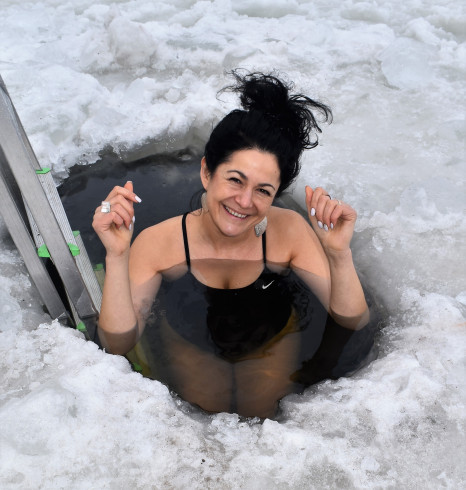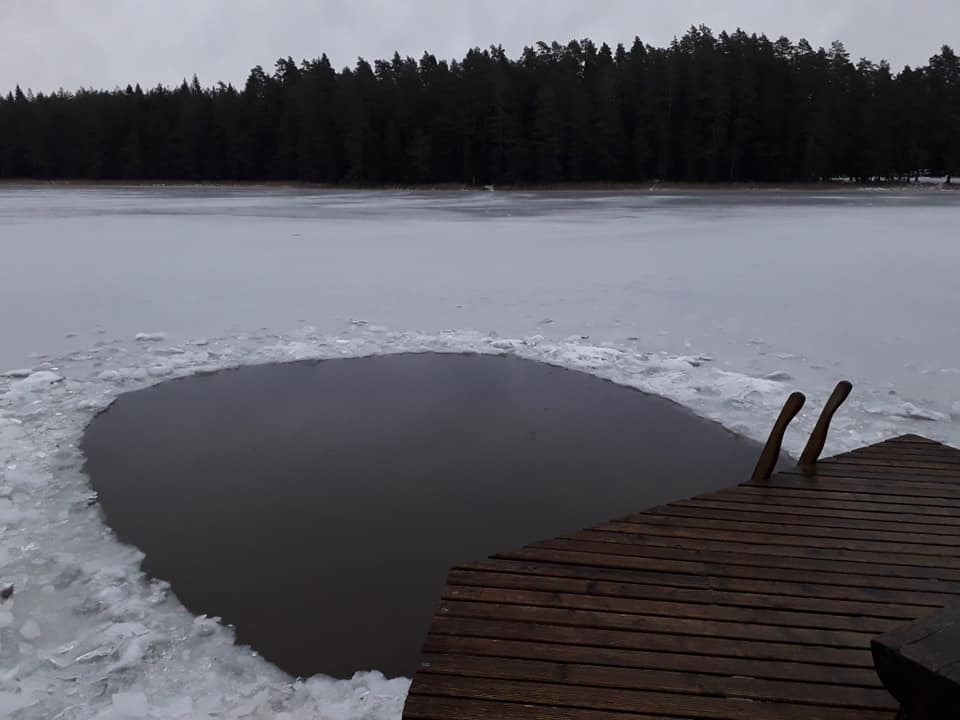Brigita Mironova isn’t one of those people who gingerly poke the water with their toe before diving in. Instead, on a Sunday morning in February, with her garden crusted with snow and the mercury south of zero, she dons her bathers and heads to a nearby pond for a refreshing dip.
Chatting with Brigita, you quickly realise she is perfectly sane, and someone this cheerful can’t be deliberately harming themselves. In fact, she is convinced that winter swimming strengthens her immune systems, relieves stress and generally feels wonderful.
“We Latvian women are very special, and winter swims help us realise our strength,” she says. “But not with macho endurance, but through self-awareness and connecting with nature.”
Shock therapy
Brigita jokes that it is no coincidence that her star sign is Pisces. Growing up in the Kurzeme town of Saldus, she adored swimming. Then on a winter’s day about 11 years ago, friends invited her for a paddle, and her aquatic season expanded to 365 days a year.
A few years later, she discovered the therapeutic benefits of the habit during a painful personal crisis. Her marriage broke up, leaving her alone with three children to look after, including a four-month-old baby. Numb with worry, she decided to have a swim.
“I went into the water like a robot, then when I got back to the car I started thinking, 'What just happened?' she recalls. “Oxygen flowed into me and I let go off those awful feelings.”
After sorting things out, she attended courses in the Netherlands run by extreme sportsman Wim Hof. Nicknamed “the Iceman,” Hof has climbed on Mount Everest in nothing but shorts and shoes and set world records for swimming under ice. His physical resilience has astonished scientists, and his system of breathing exercises and cold water immersions is now practiced around the world.

Brigita is a professional business trainer, helping companies develop stress reduction and work/ life balance policies. In 2017, she opened “Ledus skola” (The Ice School) at her home in Inčukalns, a village 50 kilometres east of Riga. After learning about physiology and breathing, pupils make their virgin swims in a small lake which is fed by numerous streams and never freezes, maintaining a constant temperature of plus six degrees all year round.
People come to her seminars for relief from anxiety or just to get an adrenaline rush. Brigita says ice swimming has helped some clients overcome panic attacks and hay fever, and to significantly reduce medication dosages for thyroid problems.
Due to the pandemic, she has transitioned to online classes, and guides people on their first swims via WhatsApp. But while she can offer a safe environment, going it alone is perfectly fine too.
“It’s a great honour to support people, but anyone can do it – you don’t really need me,” she says. “Healthy people can start straight away – our bodies are smarter than we think.”
Keeping the doctor away
Just before the new year, Brigita contracted Covid-19. She only experienced mild symptoms, which she attributes to the boost her immune system has gained from ice swimming. Life goes on - she got married for a second time on Valentine’s Day.
Of course, she stresses that during her bout with Covid she didn’t go in the water – ice swimming builds up immunity beforehand rather than curing the illness. And before jumping in, people with heart conditions, kidney problems or acute arthritis should seek medical advice.
To soften the initial shock to the system, Brigita recommends gradually acclimatising by walking barefoot, turning down the heat at home or rubbing yourself with snow. If you don’t have a convenient swimming spot, you can take a cold shower every morning, focussing on your breathing as you gradually move the water up your body.
As well as being a mood lifter and nurturing the skin, this is also a form of meditation and a chance to take healthy, deep breaths. According to Brigita, this is especially important in the age of face masks, when our brains and bodies are absorbing more CO2 and less oxygen.
“With all the uncertainty around us, this is a very challenging time for everyone, so we need methods to help ourselves to feel good,” she says. “And by plunging into the cold water for a few minutes, our bodies wake up and we realise– if I can do this, I can do anything!”
This feature was originally published on the website of the Latvian Institute and is reproduced here with permission.
































